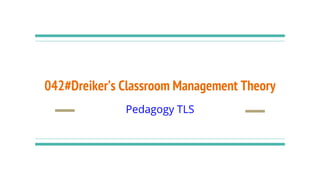
Rudolf Dreikurs' Classroom Management Theory
- 1. 042#Dreiker’s Classroom Management Theory Pedagogy TLS
- 2. Who was Rudolf Dreikurs? Rudolf Dreikurs, (born February 8, 1897, Vienna, Austria—died May 25, 1972, Chicago, Illinois, U.S.), Austrian-born American psychiatrist and educator who developed the Austrian psychologist Alfred Adler’s system of individual psychology into a pragmatic method for understanding the purposes of reprehensible behaviour in children and for stimulating cooperative behaviour without punishment or reward. The Dreikurs theory for classroom management, sometimes called Rudolf Dreikurs' theory of Social Discipline, acts as a framework for thinking through how to respond to problem behaviors in the classroom.
- 3. Alfred Adler Individual psychology, body of theories of the Austrian psychiatrist Alfred Adler, who held that the main motives of human thought and behaviour are individual man’s striving for superiority and power, partly in compensation for his feeling of inferiority. Every individual, in this view, is unique, and his personality structure—including his unique goal and ways of striving for it—finds expression in his style of life, this life-style being the product of his own creativity. Nevertheless, the individual cannot be considered apart from society; all important problems, including problems of general human relations, occupation, and love, are social.
- 4. Dreikurs model of Social Discipline Which is based on the Principles of psychology, acknowledges student’s need to fit in and blames negative behavior on the inability to do so.
- 5. This model classifies misbehavior
- 6. Four goals of Misbehavior 1. Attention-Getting 2. Power and Control 3. Revenge 4. Feelings of Inadequacy/Helplessness
- 7. 1: Attention Getting Think about misbehavior as a method of communication, a child’s way of reaching out. Firstly, There’s a difference between how your child behaves and their character. What they do is not who they are. It’s important to remember negative behavior does not make your child “bad.” One reason children misbehave is attention. When children seek attention through their behaviors they are feeling overlooked or insignificant. To get this need met, they behave in ways to make sure they get noticed. They throw their toys, hit their brother, scream or generally make life difficult.
- 8. Managing attention-seeking behaviors Oftentimes when children seek attention through their misbehavior we give them exactly what they want, but maybe not in the most constructive way. It’s easy to quickly react to these situations by yelling or scolding a child. In doing that, we give them the attention they desire, but we give them negative attention. While children would prefer positive attention over negative attention, they will accept and seek out negative attention if that is all that is offered to them. If the only time an adult pays attention to their child is by yelling or scolding in reaction to negative behaviors, the child is likely to repeat or escalate their actions to continue getting that attention. If we find a way to give the child our attention in a positive, constructive way, everyone can get what they want.